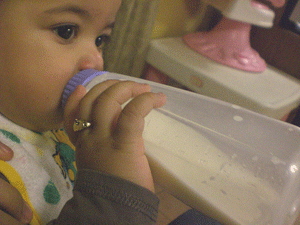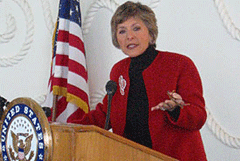Congress’ Chemical Concerns
Air Date: Week of May 2, 2008

Baby bottles containing BPA have been pulled from some store shelves; Congress wants to know how they got there. (Photo: joker4u2nv09)
Powerful Congressional committees want to know what’s gone wrong with toxic chemical regulation and the science that’s needed to safeguard public health. Living on Earth's Jeff Young tells us the wave of investigations are tied to public outrage over potentially toxic baby bottles.
Transcript
GELLERMAN: From the Jennifer and Ted Stanley Studios in Somerville, Massachusetts – this is Living on Earth. I’m Bruce Gellerman, in for Steve Curwood. From supermarket shelves to the halls of Congress, some chemicals used in everyday products are coming under intense scrutiny. Stores are pulling items, including baby bottles, that contain a potentially hazardous chemical known as BPA, or bisphenol A. And Congress has launched multiple investigations into the scientific process and regulatory agencies that are supposed to ensure the safety of the stuff we buy.
In a moment we’ll hear from a former federal official who says the system is corrupt and broken. But first, to Capitol Hill, with Living on Earth’s Washington correspondent Jeff Young.
YOUNG: Powerful congressional committees want to know what’s gone wrong with toxic chemical regulation and the science that’s needed to safeguard public health. The Senate’s environment committee heard a stinging report from the Government Accountability Office about changes the Bush administration made to an important chemical assessment program. The GAO's John Stephenson told the committee that political appointees now weigh in on a process that should be left to scientists.
STEPHENSON: They’re getting involved in the science portion in the early assessment of chemicals. They should not be muddling in the front part, in the science.
YOUNG: Stephenson says that jeopardizes science that’s vital to developing regulation, targets for cleanups or other public health protections. The GAO found bureaucratic hurdles swamped the Environmental Protection Agency’s work, delaying assessments of some likely carcinogens by years. Stephenson says the Defense Department delayed for a decade an assessment of the engine-degreasing agent TCE, which contaminates drinking water near some military bases. And his report shows that the Defense Department and other agencies can affect EPA’s chemical assessments without the public even knowing about it. California Democratic Senator Barbara Boxer chairs the environment committee.

Congresswoman Barbara Boxer. (Courtesy of the U.S. House of Representatives)
BOXER: So Instead of having the scientists at EPA decide what’s good for our health, we now have contractors, essentially, at the table. And what makes it worse is the entire process is kept secret.
YOUNG: EPA’s James Gulliford, who leads the agency’s toxic substances office, defended the process.
GULLIFORD: Ultimately it’s still, at the end of the day, it’s EPA’s decision. So I believe it’s a very – it is a transparent process. It’s a process that ultimately results in a science-based result.
YOUNG: The powerful House Committee on Energy and Commerce is also investigating the chemical industry’s influence. Democrat John Dingell of Michigan wants the industry’s main lobbying group, the American Chemistry Council, to provide details on nine scientists with ties to the industry who served on EPA’s expert review panels. Chemistry Council vice president Sharon Kneiss says the industry will cooperate with the investigation
KNEISS: We continue to provide government agencies with data regardless of the findings because we are proud stewards of our products.
YOUNG: So why all these investigations now? Well it’s largely due to revelations about the chemical bisphenol A. BPA, as it’s known, is in some plastic containers, including baby bottles, and it shows up in blood samples from infants. Animal studies show BPA affects reproductive health and development of the brain. New Jersey Democratic Senator Robert Menendez co-sponsored a bill to ban BPA, something he says regulators should have done already.
MENENDEZ: The whole purpose of our regulatory bodies is to ensure that the public’s health, safety and security is preserved, and you don’t do that as a clean up brigade; you do that as a preventer of bad things from happening, and so yeah, it does bother me a great deal.

(Baby bottles containing BPA have been pulled from some store shelves. Photo: joker4u2nv09)
YOUNG: The chemical industry and Food and Drug Administration say products containing BPA are safe. But as parents toss out suspect sippy-cups and retailers remove bottles from shelves, it’s clear many people do not agree. Richard Wiles at the Environmental Working Group says that’s focused the public on chemical consequences and forced Congress to act.
WILES: Babies will be exposed to toxic chemicals because industry has corrupted the science, and public health protections aren’t forthcoming. What began as an investigation of a contaminant in baby bottles has expanded into a government – a congressional -wide probe into corrupt science.
YOUNG: Out of the mouths of babes, as the good book says. For Living on Earth I’m Jeff Young in Washington.
Links
The Senate environment committee’s hearing on chemical assessments includes a link to the GAO report
The House energy and commerce committee’s investigation of chemical industry
The Environmental Working Group’s report on BPA in children’s products
The American Chemistry Council’s response to concerns about BPA
Living on Earth wants to hear from you!
Living on Earth
62 Calef Highway, Suite 212
Lee, NH 03861
Telephone: 617-287-4121
E-mail: comments@loe.org
Newsletter [Click here]
Donate to Living on Earth!
Living on Earth is an independent media program and relies entirely on contributions from listeners and institutions supporting public service. Please donate now to preserve an independent environmental voice.
NewsletterLiving on Earth offers a weekly delivery of the show's rundown to your mailbox. Sign up for our newsletter today!
 Sailors For The Sea: Be the change you want to sea.
Sailors For The Sea: Be the change you want to sea.
 The Grantham Foundation for the Protection of the Environment: Committed to protecting and improving the health of the global environment.
The Grantham Foundation for the Protection of the Environment: Committed to protecting and improving the health of the global environment.
 Contribute to Living on Earth and receive, as our gift to you, an archival print of one of Mark Seth Lender's extraordinary wildlife photographs. Follow the link to see Mark's current collection of photographs.
Contribute to Living on Earth and receive, as our gift to you, an archival print of one of Mark Seth Lender's extraordinary wildlife photographs. Follow the link to see Mark's current collection of photographs.
 Buy a signed copy of Mark Seth Lender's book Smeagull the Seagull & support Living on Earth
Buy a signed copy of Mark Seth Lender's book Smeagull the Seagull & support Living on Earth

